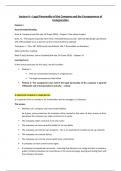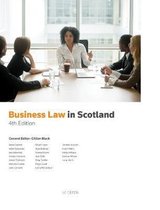Lecture 4 – Legal Personality of the Company and the Consequences of
Incorporation
Podcast 1
Recommended Reading
Grier N, Company Law (5th edn, W Green 2020) - Chapter 2 the whole chapter
Grier, N., “Piercing to Corporate Veil: Prest v Petrodel Resources Ltd,” 2014 18 Edinburgh Law Review
275-279 (available as an e-journal via the University library website)
Thompson. I, “OA v AB” 2020 Family Law Bulletin 163, 7-8 (available via Westlaw)
Optional further reading:
Black G (ed), Business Law in Scotland (4th edn, W Green 2019) - Chapter 14
Learning Focus
In the lecture podcasts for this topic, we will consider:
▪ Podcast 1:
▪ How an incorporated company is a legal person
▪ The legal consequences that follow
▪ Podcast 2: The exceptional cases where the legal personality of the company is ignored
(‘lifting the veil of incorporation’) and why. – critical
A registered company is a legal person
It is separate from its members, its shareholders and its managers, its directors.
This means:
▪ Members of a company can have limited liability
So it gives some protection for members either limited to the value of their shares or their
guarantee the company can make contracts in its name.
▪ The company makes contracts in its own name
▪ The company can borrow and be liable for its own debts
▪ The company can hold its own property – this is so important if it wishes to set up a branch.
▪ The company can commit delicts
▪ The company can commit crimes (with some restrictions)
▪ A company can have some human rights
▪ A company has perpetual succession – meaning that directors can resign and join a company.
public, limited companies can treat shares in the stock exchange, buying and selling them and
the company still exists.
, ▪ A company can have parent and subsidiary companies – meaning that it can operate as a
group structure if it chooses.
Leading cases on legal personality
1. Salomon v Salomon & Co Ltd [1897] AC 22
A company can owe money to its main shareholder – watch this interesting You Tube video
from a student at the National University of Galway, Ireland explaining the case.
2. Macaura v Northern Assurance Ltd [1925] AC 619
The shareholders have no direct interest in the company’s property.
3. Lee v Lee’s Air Farming Ltd [1961] AC 12
The main shareholder of a company can also be an employee.
Salomon v Salomon & Co Ltd [1897] AC 22, 51
Mr. Salomon operated a boot manufacturing business, and he sold that business to himself by
incorporating a new business, a Salomon & Co Ltd. He sold his business to the incorporated company
for about £39,000 which is about £3.5 million pounds today. The company could not pay that purchase
price to acquire the business from Salomon. So, there was some financial arrangement made where
there'd be a combination of a loan and a security over assets belonging to the company. In addition,
Salomon transferred debentures or shares to another businessman called Broderick. The company
then unfortunately went into financial difficulty. Broderick was not receiving his money, thus he sued
for his money and the company went into receivership and then liquidation. Broderick got his money
back as a secured creditor And there was no money left over for all of the other creditors that the
company owed money to. So the creditors took the company to court, arguing that Salomon was
personally liable for not setting up the company properly and that he should be personally liable to
the creditors for monies owed to them.
The House of Lords held that Salomon had complied with the Companies Act 1862 when he
incorporated his business into a limited company. There was no evidence of fraud on the basis of the
value of the business. Salomon had legitimately acted and the court noted that the creditors were
fully aware that they had been dealing with a limited company and not Salomon personally. So in
dealing with the company, the creditor basically had to be aware of a risk in doing so. One such risk is
that a secured creditor is in an advantageous position, such as Broderick, over unsecured creditors.
Salomon was not personally liable for those creditors.
We take two things from the decision:
1. Salomon and the company are two separate legal personalities who were free to contract with
each other.
2. In the absence of fraud, there was nothing wrong with Salomon being a secured creditor of
his own company.





